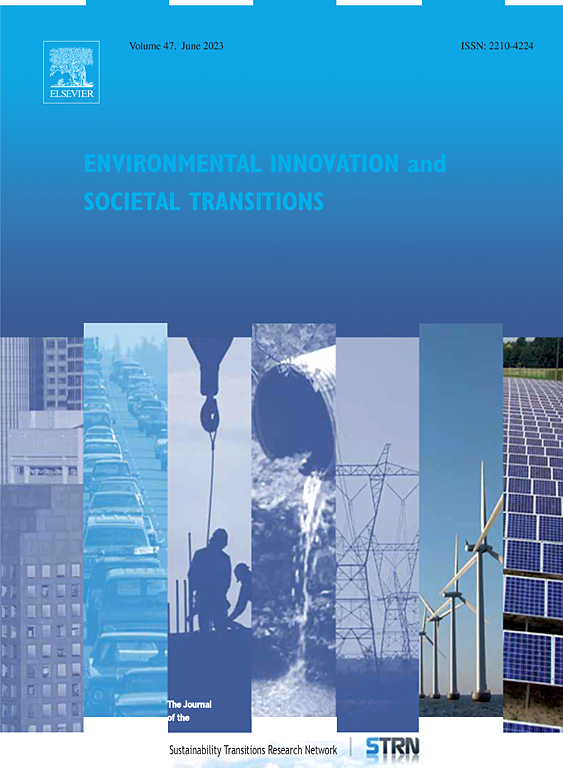Academic Institutions as Innovation Intermediaries; Co-creating knowledge and building the Gujarat agroecology learning alliance (GALA)
IF 6.1
2区 经济学
Q1 ENVIRONMENTAL SCIENCES
Environmental Innovation and Societal Transitions
Pub Date : 2025-07-22
DOI:10.1016/j.eist.2025.101033
引用次数: 0
Abstract
The role of Higher Education Institutions (HEIs) as innovation intermediaries remains underexplored in sustainability transitions (ST) research, particularly in agri-food systems in the Global South. This paper examines how a HEI in India facilitated the building of a Learning Alliance in agroecology in Gujarat. The HEI acted as a boundary-spanning knowledge broker—mapping contested visions of sustainability, convening dissimilar actors, and enabling shared learning and co-production of agroecological knowledge. The paper highlights how such intermediation contributes to collective learning alliances and pluralising pathways to transition. It argues for expanding the repertoire of transition intermediaries to include engaged academic institutions, especially where formal systems marginalize grassroots actors. By fostering inclusive governance and mapping situated knowledge, HEIs and civil society can together create platforms for collective experimentation. The case demonstrates the potential for networked governance to leverage the latent capacities of communities for scaling sustainability transitions.
学术机构作为创新中介共同创造知识并建立古吉拉特邦农业生态学习联盟(GALA)
高等教育机构(HEIs)作为创新中介的作用在可持续转型(ST)研究中仍未得到充分探索,特别是在全球南方的农业粮食系统中。本文考察了印度高等教育机构如何促进古吉拉特邦农业生态学学习联盟的建立。HEI作为一个跨界的知识中间人,绘制出有争议的可持续性愿景,召集不同的行动者,实现农业生态知识的共享学习和共同生产。本文强调了这种中介如何有助于集体学习联盟和多元化转型途径。它主张扩大过渡中介机构的范围,使之包括参与其中的学术机构,特别是在正规制度将基层行动者边缘化的地方。通过促进包容性治理和测绘现有知识,高等教育机构和民间社会可以共同创造集体实验的平台。该案例展示了网络治理利用社区潜在能力扩大可持续性转型的潜力。
本文章由计算机程序翻译,如有差异,请以英文原文为准。
求助全文
约1分钟内获得全文
求助全文
来源期刊

Environmental Innovation and Societal Transitions
Energy-Renewable Energy, Sustainability and the Environment
CiteScore
13.60
自引率
19.40%
发文量
90
审稿时长
56 days
期刊介绍:
Environmental Innovation and Societal Transitions serves as a platform for reporting studies on innovations and socio-economic transitions aimed at fostering an environmentally sustainable economy, thereby addressing structural resource scarcity and environmental challenges, particularly those associated with fossil energy use and climate change. The journal focuses on various forms of innovation, including technological, organizational, economic, institutional, and political, as well as economy-wide and sectoral changes in areas such as energy, transport, agriculture, and water management. It endeavors to tackle complex questions concerning social, economic, behavioral-psychological, and political barriers and opportunities, along with their intricate interactions. With a multidisciplinary approach and methodological openness, the journal welcomes contributions from a wide array of disciplines within the social, environmental, and innovation sciences.
 求助内容:
求助内容: 应助结果提醒方式:
应助结果提醒方式:


